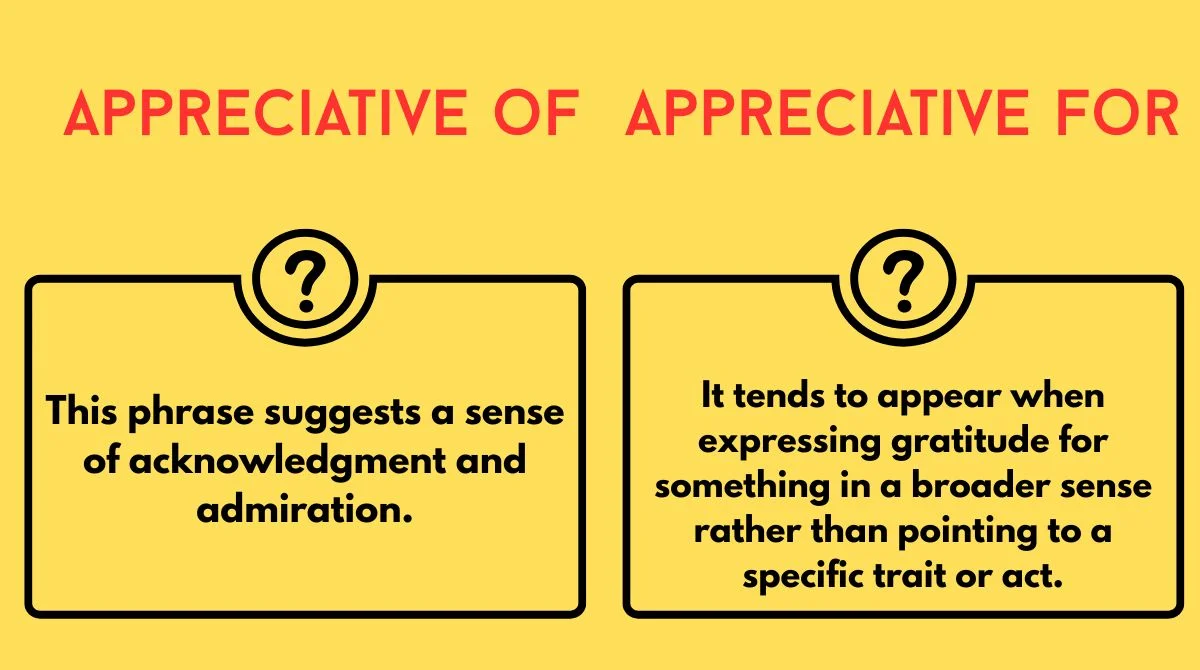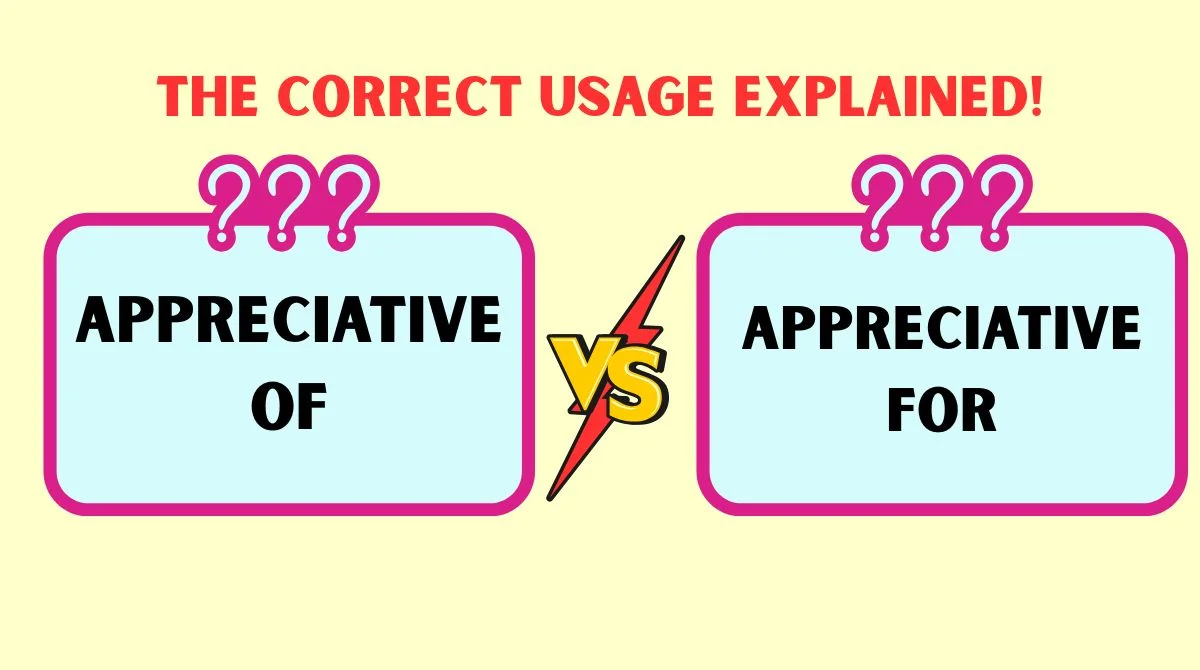Last updated on September 14th, 2025 at 11:39 am
Language nuances can be tricky, especially when it comes to prepositions.
A common point of confusion is whether to use “appreciative of” or “appreciative for.” While both may seem interchangeable, they carry subtle differences in meaning.
This guide will explore their proper usage, providing clear explanations, examples, and historical insights to help you master them.
Should you say appreciative of or appreciative for? While both exist, appreciative of is the standard choice when recognizing specific qualities or efforts. Learn the key differences and when to use each correctly!
Understanding the Nuanced Use of “Appreciative”
The word appreciative is an adjective that describes the feeling of gratitude, recognition, or admiration toward something or someone. However, the meaning shifts slightly depending on the preposition that follows it.
Using appreciative of or appreciative for depends on the type of gratitude being expressed and the intended context. Let’s break them down.
Deciphering the Correct Context for “Appreciative of”
The phrase appreciative of is the more commonly accepted construction in standard English. It is used when someone recognizes and values a specific thing, quality, or act. The focus here is on the object being appreciated.
Examples of Correct Usage:
- “She is appreciative of his generosity.”
- “They were appreciative of the opportunity to speak.”
- “I am appreciative of your support during this time.”
Key takeaway: Appreciative of works best when highlighting admiration, recognition, or respect for a particular action, trait, or object.
The Relationship Between “Appreciative of” and Specific Qualities
When we say someone is appreciative of something, it typically emphasizes a particular characteristic or effort. This phrase suggests a sense of acknowledgment and admiration.
When to Use “Appreciative of”:
- When expressing gratitude for a specific act (“She was appreciative of his help.”)
- When acknowledging a quality or characteristic (“He was appreciative of her honesty.”)
- When referring to an opportunity (“I am appreciative of the chance to learn.”)
This usage aligns with how English speakers naturally express acknowledgment toward a direct object.
Examples That Illustrate “Appreciative of” in Sentences
Consider the following examples:
| Sentence | Explanation |
|---|---|
| “He was appreciative of the detailed feedback.” | Highlights admiration for a specific type of feedback. |
| “The manager was appreciative of the team’s dedication.” | Acknowledges the quality of dedication. |
| “She felt appreciative of the beautiful sunset.” | Expresses admiration for a specific scene. |
These sentences show that appreciative of is most appropriate when discussing concrete aspects of gratitude.

“Appreciative for” in Language: Expressing General Gratitude
The phrase appreciative for is less commonly used but not entirely incorrect. It tends to appear when expressing gratitude for something in a broader sense rather than pointing to a specific trait or act.
Examples of Usage:
- “We are appreciative for all the support we’ve received.”
- “She was appreciative for the chance to participate.”
In these cases, appreciative for implies a general sense of thankfulness rather than recognition of a specific quality.
Key takeaway: While appreciative for can sometimes be acceptable, appreciative of remains the more natural and widely accepted choice in most situations.
The Role of Prepositions in Conveying Meaning
Prepositions are small but powerful words that dictate the relationship between elements in a sentence. Choosing the right one can significantly impact the meaning conveyed.
- “Appreciative of” = Emphasizing recognition or acknowledgment of something specific.
- “Appreciative for” = Suggesting general gratitude for something broader.
Understanding this distinction helps ensure clarity and precision in writing.
The Subtle Differences Between Prepositions
The reason of is preferred in most cases is due to its grammatical function. The preposition of typically follows adjectives related to emotions and perception, like:
- “Afraid of”
- “Proud of”
- “Aware of”
- “Appreciative of”
Since appreciative expresses a form of recognition, it naturally aligns with of. Meanwhile, for often follows adjectives that express necessity or suitability, such as:
- “Responsible for”
- “Famous for”
- “Grateful for”
This subtle grammatical pattern explains why appreciative of is the dominant choice in English.
Why “Of” and “For” Can Change the Intent of “Appreciative”
To further illustrate how the preposition affects meaning, compare these sentences:
| Sentence | Meaning |
|---|---|
| “She is appreciative of the effort.” | She acknowledges and values the effort. |
| “She is appreciative for the opportunity.” | She is generally thankful for the opportunity. |
While both sentences make sense, the first one pinpoints a specific aspect, while the second conveys overall gratitude.
Historical Usage Trends of “Appreciative of” Versus “Appreciative for”
Language evolves over time, and historical usage can shed light on why one form is more dominant.
According to linguistic data from corpora like Google Ngram Viewer:
- “Appreciative of” has consistently appeared more frequently in published works.
- “Appreciative for” is much rarer and is mostly found in informal contexts.
This pattern reinforces why “appreciative of” remains the standard choice.
Common Misconceptions and Errors in Using “Appreciative”
Many English learners and even native speakers sometimes misuse these phrases.
Common Mistakes:
❌ “I am appreciative for your kindness.” (Better: Appreciative of your kindness.)
❌ “She is appreciative for the support.” (Better: Appreciative of the support.)
These errors arise because “grateful for” sounds natural, leading people to mistakenly apply the same structure to “appreciative.”
How Native Speakers Mistakenly Interchange These Terms
While native speakers intuitively use “appreciative of” more often, mistakes still happen, especially in spoken English. This often stems from:
- Confusing “grateful for” and “appreciative for.”
- Using “for” when expressing general gratitude instead of specific recognition.
To avoid errors, always test whether “grateful” could be substituted—if it fits better, “for” is likely correct. Otherwise, “of” is the safer choice.
Understanding the Importance of Contextual Clarity
Context is everything in language. Before choosing a preposition, consider:
- Are you emphasizing a particular characteristic? → Use “appreciative of.”
- Are you broadly expressing thankfulness? → “Appreciative for” might work but is less common.
Final Advice on Mastering the Use of “Appreciative”
- Use appreciative of when recognizing specific qualities or efforts.
- Use appreciative for sparingly, only when referring to general gratitude.
- When in doubt, opt for of—it is the grammatically preferred choice.

FAQs
1. Is “appreciative of” or “appreciative for” correct?
“Appreciative of” is the correct and widely accepted phrase. It expresses gratitude or admiration for a specific quality, effort, or act. Appreciative for is uncommon but may be used to show general thankfulness.
2. When should I use “appreciative of”?
Use appreciative of when acknowledging or recognizing a specific quality or effort. Example: “She is appreciative of his hard work.”
3. Is “appreciative for” grammatically incorrect?
While not strictly incorrect, appreciative for is much less common. It may be used when expressing general gratitude but is often replaced with grateful for.
4. Can “appreciative of” and “grateful for” be used interchangeably?
Not always. Grateful for is broader and expresses thankfulness for something received, while appreciative of emphasizes recognizing value in something.
5. Why is “of” preferred in “appreciative of”?
The preposition of typically follows adjectives related to emotions and perception, such as afraid of or aware of, making appreciative of the natural choice.
6. What is a common mistake with “appreciative of” and “appreciative for”?
A common mistake is saying “I am appreciative for your kindness,” which should be “I am appreciative of your kindness.”
Conclusion
Both appreciative of and appreciative for exist in English, but appreciative of is overwhelmingly preferred. Understanding their subtle differences will enhance your clarity and confidence in writing.
By remembering these distinctions and practicing their usage, you’ll avoid common pitfalls and sound more natural in your communication.
